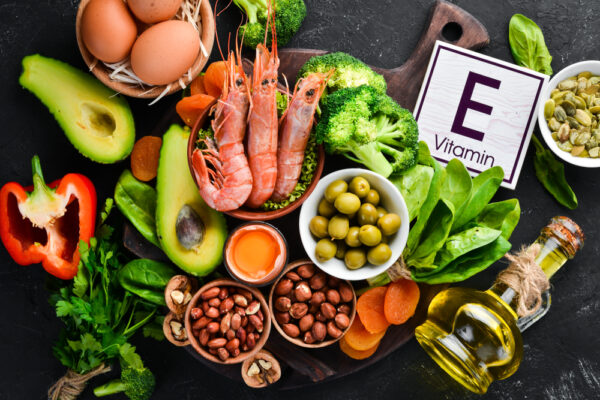Wellhealthorganic.com:vitamin-e-health-benefits-and-nutritional-sources: Are you seeking to enhance your overall health and wellness? Look no further than vitamin E! This potent antioxidant boasts a myriad of benefits, from shielding your cells against oxidative stress to promoting vibrant skin and hair. Fortunately, numerous delicious and nutritious sources make it easy to incorporate this essential nutrient into your diet. In this article, we will delve into the various health advantages of vitamin E and provide practical ways to integrate it into your daily nutrition. Elevate your well-being with WellHealthOrganic.com!
Understanding Vitamin E
Vitamin E is a vital nutrient crucial for maintaining good health. It plays a pivotal role in shielding cells from damage, reducing the risk of certain cancers, enhancing immune system function, and aiding in food metabolism.
Top sources of vitamin E include olive oil, hemp seeds, almonds, avocados, and green leafy vegetables. Additionally, you can find vitamin E in multivitamins and certain dietary supplements.
Health Benefits of Vitamin E
The health benefits of vitamin E are extensive. This nutrient safeguards the body against damage from the sun and environmental factors, supports cell growth and function, and helps regulate cholesterol levels. While it is primarily found in vegetable oils and nuts, fortified foods like cereal and milk products also contain vitamin E.
Also Read : Wellhealthorganic.com know the causes of white hair and easy ways to prevent it naturally
Recommended Daily Intake
As per the National Institutes of Health, individuals need up to 15 milligrams (mg) of vitamin E daily. Most multivitamins provide at least 8 mg, so it’s essential to choose supplements that include this crucial nutrient.
The advantages of vitamin E range from reducing the risk of heart disease and cancer to preventing wrinkles and age-related cognitive decline. Whether through nutrient-rich foods or supplements, achieving your daily vitamin E quota is crucial.
Sources of Vitamin E
Here are some excellent dietary sources of vitamin E:
- Organic Cold-Pressed Olive Oil: Approximately 1 tablespoon contains around 10 mg of vitamin E.
- Nuts: Almonds, Brazil nuts, hazelnuts, macadamia nuts, pistachios, and walnuts are rich in vitamin E.
- Fruits: Apricots, bananas, cantaloupe, grapefruit juice, honeydews, kiwifruit, and oranges are good sources.
- Vegetables: Asparagus spears, Brussels sprouts, broccoli florets, celery stalks, and sweet potatoes (cauliflower also contains small amounts).
Finding Vitamin E Sources
Vitamin E, an antioxidant renowned for its health benefits, is linked to reducing the risk of heart disease and certain cancers. However, not all sources are created equal. Here are some of the best dietary sources:
- Nuts and Seeds: Almonds, hazelnuts, pistachios, and sunflower seeds, high in omega-3 fatty acids, contribute to overall health.
- Green Leafy Vegetables: Kale, spinach, Swiss chard, collard greens, cabbage, Brussels sprouts, and cauliflower are excellent sources of vitamin E and antioxidants.
- Fortified Foods: Many modern foods are fortified with vitamin E to ensure adequate nutrient intake.
Also Read : Wellhealthorganic.com know why not to reuse plastic water bottles know its reason in Hindi
Conclusion
Wellhealthorganic.com:vitamin-e-health-benefits-and-nutritional-sources, Vitamin E stands as a potent antioxidant, showcasing protective effects on vital organs such as the heart, lungs, and liver. It also proves effective in treating skin conditions like eczema and psoriasis. Incorporate vitamin E into your diet through vegetable oils, nuts, seeds, and fruits for a healthier, more resilient you.
FAQs
1. What is the role of vitamin E in the body?
Ans: Vitamin E plays a crucial role as an antioxidant, protecting cells from damage. It also supports immune function, aids in cell growth, and contributes to food metabolism.
2. What are the primary food sources of vitamin E?
Ans: Excellent sources of vitamin E include olive oil, nuts (such as almonds and hazelnuts), seeds (like sunflower seeds), green leafy vegetables (such as spinach and kale), and fruits (including apricots and kiwifruit).
3. How much vitamin E do I need daily?
Ans: According to the National Institutes of Health, individuals require up to 15 milligrams of vitamin E daily. Most multivitamins typically provide at least 8 mg, making it essential to check supplement labels.
4. Can vitamin E reduce the risk of certain diseases?
Ans: Yes, vitamin E has been linked to a lower risk of heart disease and some forms of cancer. Its antioxidant properties contribute to overall health, protecting against environmental factors and oxidative stress.
5. Are there alternative ways to consume vitamin E if dietary sources are limited?
Ans: Yes, besides natural food sources, vitamin E can be obtained through fortified foods and dietary supplements. Fortification ensures that individuals meet their daily vitamin E requirements, especially if dietary intake is insufficient.




